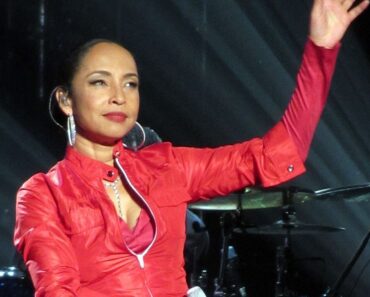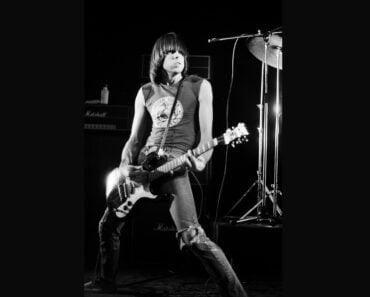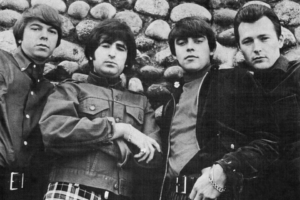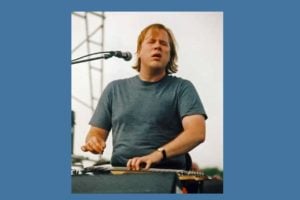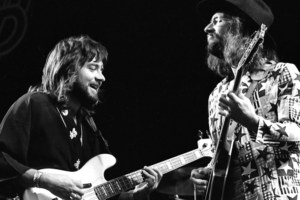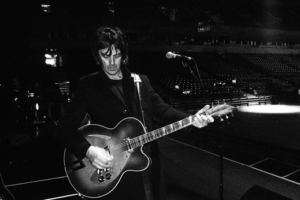
Feature Photo: Jim Summaria, http://www.jimsummariaphoto.com, CC BY-SA 3.0 <https://creativecommons.org/licenses/by-sa/3.0>, via Wikimedia Commons
The musical landscape of Arkansas was forever changed when a group of high school friends from the small town of Black Oak began creating what would become one of the most distinctive sounds in Southern rock history. Black Oak Arkansas, a popular rock and roll band of the 1970s from rural Arkansas near Black Oak (Craighead County), was the first Arkansas rock band to have significant commercial success. The band reached the height of its fame in the 1970s, charting ten albums. Through multiple lineup changes, breakups, and reunions spanning more than five decades, Black Oak Arkansas has maintained its place in rock history while navigating the challenges of an ever-evolving music industry.
Originally called the Knowbody Else, the band was formed in 1965 by singer James “Jim Dandy” Mangrum from Black Oak and guitarist Rickie Lee Reynolds from Manila (Mississippi County). The original formation included multiple guitarists creating their signature three-guitar sound, with Stanley “Goober Grin” Knight (guitar), Harvey “Burley” Jett (guitar), Pat “Dirty” Daugherty (bass), and Wayne “Squeezebox” Evans (drums) rounding out the classic lineup. After releasing albums as The Knowbody Else on Stax Records, the band was “discovered” in California by Ahmet Ertegun of Atlantic Records, who signed the band in 1970. They changed their name to Black Oak Arkansas and released the eponymous album Black Oak Arkansas in 1971 on Atco, a subsidiary of Atlantic.
The band’s commercial peak came during the early to mid-1970s when the band toured extensively from 1972 to 1977 and became known for its high-energy shows and Mangrum’s overt sexuality. In those years, the band was one of the highest grossing live acts in the United States. Their breakthrough single “Jim Dandy,” which reached number 25 on Billboard’s Hot 100 established them as major players in the Southern rock scene. However, by the late 1970s, diminishing record sales and internal conflicts led to significant lineup changes, with Mangrum dropped “Arkansas” from the group’s name in an attempt to downplay their Southern-ness and replaced everyone except Henderson. Despite these challenges, the band has continued to evolve and perform, with Jim Dandy continuing to record and tour with a series of different Black Oak Arkansas lineups up to present day.
Jim “Dandy” Mangrum
James Mangrum (born March 30, 1948), better known as Jim “Dandy” Mangrum, is an American singer. He is the lead singer and frontman of the Southern rock band Black Oak Arkansas, in which he is the sole remaining original member. Born in Benton Harbor, Michigan, where his Arkansas-born parents were working temporarily, Mangrum was raised in the small town of Black Oak, Arkansas, attending Monette High School. While in high school, Mangrum and classmate Rickie Lee Reynolds formed a band named The Knowbody Else. Originally, the band featured Ronnie “Chicky Hawk” Smith as vocalist, but the key piece fell into place when original vocalist Ronnie “Chicky Hawk” Smith decided he preferred the technical work of stage management and recommended his pal James Mangrum as the group’s front man.
Mangrum’s unique vocal style and flamboyant stage presence became the defining characteristics of Black Oak Arkansas. He is noted for his raspy voice, long hair, and wild stage antics. His influence extended beyond his own band, as the blond, long-haired Mangrum performed bare-chested and wore tight, white spandex pants, influencing such performers as David Lee Roth, Jesse James DuPree, and Axl Rose in later years. Throughout the band’s various incarnations, Mangrum remained the constant, steering the group through numerous lineup changes and musical evolutions.
From the original Knowbody Else recordings through the classic Atlantic Records era, Mangrum appeared on all the band’s major releases including “Black Oak Arkansas” (1971), “Keep the Faith” (1972), “If An Angel Came to See You, Would You Make Her Feel At Home?” (1972), “High on the Hog” (1973), and “Street Party” (1974). During the band’s decline in the late 1970s, he temporarily altered his vocal style and dropped “Arkansas” from the band name, releasing “Race with the Devil” (1977) and “I’d Rather Be Sailing” (1978) under the shortened name “Black Oak.” In the early 1980s, when Mangrum temporarily left for health reasons, the band continued without him, but he returned to lead various incarnations throughout the decades.
Beyond Black Oak Arkansas, Mangrum has maintained relationships with Arkansas political figures and continued his charitable work in the state. Band members and their families lived in Oakland (Marion County) during much of the 1970s and even helped to fund the construction of the local school. His career outside the band includes business ventures and occasional solo projects, though he has remained primarily focused on Black Oak Arkansas throughout his career. As of 2011, Mangrum continues to record and tour with a series of different Black Oak Arkansas lineups.
Rickie Lee “Risky” Reynolds
Rickie Lee Reynolds, also known by his stage names “Risky” and “Ricochet,” was a founding member and primary guitarist for Black Oak Arkansas from its inception as The Knowbody Else. Originally called the Knowbody Else, the band was formed in 1965 by singer James “Jim Dandy” Mangrum from Black Oak and guitarist Rickie Lee Reynolds from Manila (Mississippi County). As one of the architects of the band’s distinctive three-guitar sound, Reynolds provided the rhythmic foundation that supported the band’s twin lead guitar approach throughout their most successful period.
Reynolds appeared on all of the band’s classic recordings, contributing rhythm guitar and twelve-string guitar parts to albums including “Black Oak Arkansas” (1971), “Keep the Faith” (1972), “If An Angel Came to See You, Would You Make Her Feel At Home?” (1972), “Raunch ‘N’ Roll Live” (1973), “High on the Hog” (1973), “Street Party” (1974), and “Ain’t Life Grand” (1975). His guitar work was integral to establishing the band’s sound, which mixed hard rock, down-home Dixie boogie, and quasi-mystical country music. During the band’s peak touring years from 1972 to 1977, Reynolds was part of the core lineup that made Black Oak Arkansas one of the highest-grossing live acts in the United States.
When the band’s lineup began fragmenting in 1976, Reynolds departed along with most of the other original members. In 1976, they released two nondescript and unsuccessful albums for MCA, Balls of Fire and 10 Yr Overnight Success, the latter as a five-piece band with the departure of Rickie Reynolds, who was replaced on tour by keyboardist Marius Penczner during this period. Reynolds remained away from the band for several years during their commercial decline in the late 1970s and early 1980s.
The guitarist returned to Black Oak Arkansas in 1984, marking his comeback with the album “Ready as Hell.” Released in 1984, Ready as Hell debuted a heavier sound with pinch harmonics and keyboards featured throughout. The album also marked the return of Rickie Lee Reynolds on rhythm guitar. His return brought renewed energy to the band, and he continued as a core member through various reunions and touring configurations. Rickie Lee “Risky”/”Ricochet” Reynolds – rhythm guitar, 12-string guitar, vocals (1965–1977, 1984–2021) (died 2021) Reynolds remained with the band until his death in 2021, making him one of the longest-serving members alongside Jim Dandy Mangrum.
Outside of Black Oak Arkansas, Reynolds maintained a lower profile compared to some of his bandmates, focusing primarily on his work with the band rather than pursuing extensive solo projects. His contributions to the Southern rock genre through his guitar work with Black Oak Arkansas influenced countless musicians and helped establish the template for the multi-guitar approach that became characteristic of the style. Reynolds’ death in 2021 marked the end of an era for the band, as he was the last surviving founding member besides Jim Dandy Mangrum.
Stanley “Goober Grin” Knight
Stanley Knight was one of the original guitarists in Black Oak Arkansas and a key architect of their signature three-guitar sound. Stanley “Goober” Knight from Little Rock (Pulaski County) on guitars joined the band during its formation as The Knowbody Else and remained through their transformation into Black Oak Arkansas and their rise to national prominence. As one of the lead guitarists alongside Harvey Jett, Knight helped establish the distinctive guitar harmonies and interplay that became a hallmark of the band’s sound.
Knight appeared on the band’s earliest recordings as The Knowbody Else and continued through their major label breakthrough. His guitar work can be heard on classic albums including “Black Oak Arkansas” (1971), “Keep the Faith” (1972), “If An Angel Came to See You, Would You Make Her Feel At Home?” (1972), “Raunch ‘N’ Roll Live” (1973), “High on the Hog” (1973), and “Street Party” (1974). During this period, the three-guitar configuration of Knight, Harvey Jett, and Rickie Lee Reynolds created a powerful wall of sound that set Black Oak Arkansas apart from their contemporaries in the Southern rock scene.
Stanley Knight – lead guitar, steel guitar, organ, vocals (1965-1976) demonstrates his versatility as a musician, contributing not only lead guitar but also steel guitar, organ, and vocals to the band’s recordings. This multi-instrumental approach was typical of the era and added depth to the band’s sound beyond their famous guitar work. Knight’s ability to switch between instruments allowed the band greater flexibility in their arrangements and live performances.
After departing the band in 1976 during the period of lineup changes that marked the end of their classic era, Knight pursued other musical endeavors. However, his connection to Black Oak Arkansas remained strong. During the early 2000s, original lead guitarist Stanley Knight would join them on the road, not playing guitar, but as their soundman. This behind-the-scenes role allowed him to remain connected to the band while contributing his technical expertise to their live performances.
Knight’s career outside Black Oak Arkansas included various musical projects and session work, though he maintained a relatively low profile compared to some of his former bandmates. His influence on the Southern rock guitar style through his work with Black Oak Arkansas continued to be felt long after his departure from the band. The three-guitar approach that he helped pioneer became a template for many subsequent Southern rock bands, and his contributions to the genre’s development remain significant despite his stepping away from the spotlight in later years.
Harvey “Burley” Jett
Harvey Jett was one of the original lead guitarists for Black Oak Arkansas and a crucial component of their innovative three-guitar configuration. Harvey “Burley” Jett of Marion (Crittenden County) brought a distinctive lead guitar style that, combined with Stanley Knight’s guitar work and Rickie Lee Reynolds’ rhythm playing, created the signature sound that propelled the band to national success. As one of the founding members, Jett was instrumental in developing the musical arrangements that would define Southern rock.
Jett’s guitar work can be heard on all of Black Oak Arkansas’s classic recordings during their most successful period. He contributed lead guitar, banjo, piano, and vocals to albums including “Black Oak Arkansas” (1971), “Keep the Faith” (1972), “If An Angel Came to See You, Would You Make Her Feel At Home?” (1972), “Raunch ‘N’ Roll Live” (1973), “High on the Hog” (1973), and “Street Party” (1974). Harvey Jett – lead guitar, banjo, piano, vocals (1965-1974) showcases his versatility as a musician, demonstrating abilities beyond just electric guitar that enriched the band’s sonic palette.
The guitar interplay between Jett and Stanley Knight became one of Black Oak Arkansas’s most distinctive features, with the two guitarists weaving complex harmonies and trading solos that influenced countless musicians in the Southern rock genre. Their collaborative approach helped establish many of the conventions that would be adopted by later bands in the style. During the band’s peak years from 1972 to 1974, Jett’s guitar work was featured prominently in their live performances, which were noted for their high energy and musical virtuosity.
Guitarist Harvey Jett left the band after Street Party and was replaced by Jimmy “Soybean” Henderson in 1975, marking the end of an era for the classic Black Oak Arkansas lineup. His departure came during a period of transition for the band as they were experiencing diminishing commercial returns despite remaining a strong live draw. Jett’s decision to leave coincided with other changes in the band’s lineup and marked the beginning of the end for their classic period.
After leaving Black Oak Arkansas, Jett pursued various musical projects and maintained a career in music, though he kept a lower profile than during his time with the band. Harvey “Burley” Jett – lead guitar, banjo, piano, vocals (1965–1974) (died 2022) indicates that he remained active in music until his death in 2022. His contributions to the development of Southern rock guitar playing through his innovative work with Black Oak Arkansas continued to influence musicians long after his departure from the band. The guitar techniques and approaches he developed with Stanley Knight became foundational elements of the Southern rock sound.
Pat “Dirty” Daugherty
Pat Daugherty was the original bass guitarist for Black Oak Arkansas and a founding member who provided the rhythmic foundation for the band’s distinctive sound. Pat “Dirty” Daugherty from Jonesboro (Craighead County) on bass guitar was part of the core group that transformed from The Knowbody Else into one of the most successful Southern rock bands of the 1970s. His bass playing was integral to establishing the groove that supported the band’s three-guitar approach and dynamic vocal performances.
Daugherty appeared on all of Black Oak Arkansas’s classic recordings, providing bass guitar and vocals on albums including “Black Oak Arkansas” (1971), “Keep the Faith” (1972), “If An Angel Came to See You, Would You Make Her Feel At Home?” (1972), “Raunch ‘N’ Roll Live” (1973), “High on the Hog” (1973), “Street Party” (1974), and “Ain’t Life Grand” (1975). His bass work provided the solid foundation that allowed the multiple guitarists to create their complex interplay while maintaining the rhythmic drive that made the band’s songs so effective both on record and in live performance.
During the band’s peak years from 1972 to 1977, Daugherty was part of the core lineup that made Black Oak Arkansas one of the highest-grossing live acts in the United States. Pat Daugherty – bass guitar, vocals (1965-1977, 2000-2002) shows his long-term commitment to the band despite the various changes in lineup and musical direction that occurred over the decades. His backing vocals also contributed to the band’s vocal harmonies, adding another layer to their sound beyond his bass playing.
Like most of the other original members, Daugherty departed the band in 1977 as their commercial success waned and internal tensions increased. Patrick “Dirty” Daugherty rejoined in 1995, rekindling the once-forgotten Black Oak Arkansas. This momentum brought on a surge of performances with other 70’s greats such as Foghat, Iron Butterfly, Edgar Winter Group, and many more. His return in the 1990s marked a significant reunion that helped revitalize interest in the band and led to renewed touring activity.
Daugherty’s second stint with the band lasted until the mid-2000s. Pat left the band a second time in the mid-2000s. Between his two periods with Black Oak Arkansas, he pursued other musical projects and maintained his career as a bassist. His contributions to the development of Southern rock bass playing through his work with Black Oak Arkansas influenced many musicians, and his solid, driving bass style became a template for the genre. The reunions featuring original members like Daugherty helped introduce the band’s classic material to new generations of fans while satisfying longtime followers who remembered the band’s peak years.
Wayne “Squeezebox” Evans
Wayne Evans was the original drummer for Black Oak Arkansas during their formation and early development, providing the rhythmic foundation during their transition from The Knowbody Else to their major label success. Wayne Evans – drums (1965-1973) was part of the founding lineup that developed the band’s distinctive sound and approach, playing a crucial role in their early recordings and live performances that established their reputation in the Southern rock scene.
Evans appeared on the band’s earliest recordings as The Knowbody Else and continued through their transformation into Black Oak Arkansas and their initial major label success. His drumming can be heard on “Black Oak Arkansas” (1971) and “Keep the Faith” (1972), helping to establish the powerful rhythmic foundation that supported the band’s innovative three-guitar approach. His playing style complemented the band’s high-energy approach and provided the driving beat that made their songs effective both on record and in live performance.
During the early 1970s, Evans was part of the touring lineup that began building Black Oak Arkansas’s reputation as a formidable live act. That’s when they had their first drummer, Wayne Evans, before Tommy Aldridge. They just kicked butt. His contributions during this period were essential to the band’s development, as they refined their sound and stage presentation through extensive touring before achieving their commercial breakthrough.
After the Atco debut album, Tommy Aldridge replaced Wayne Evans on drums, as the band became a more professional touring unit. Evans’s departure in 1973 coincided with the band’s transition to a more professional level of operation as their commercial success increased. The decision to bring in Tommy Aldridge reflected the band’s need for a drummer who could handle the demands of major touring and the more complex musical arrangements they were developing.
After leaving Black Oak Arkansas, Evans pursued other musical endeavors and maintained his career as a drummer, though he remained less visible than some of his former bandmates who continued with higher-profile projects. His contributions to the early development of Black Oak Arkansas were significant in establishing the foundation upon which their later success was built. The rhythmic approach he established during the band’s formative years helped shape their sound and provided the template for the more elaborate arrangements that would follow with subsequent drummers.
Tommy Aldridge
Tommy Aldridge joined Black Oak Arkansas in 1973, replacing original drummer Wayne Evans as the band transitioned to a more professional level of touring and recording. Tommy Aldridge (born August 15, 1950) is an American heavy metal and hard rock drummer. He is noted for his work with numerous bands and artists since the 1970s, such as Black Oak Arkansas, Pat Travers Band, Ozzy Osbourne, Gary Moore, Whitesnake, Ted Nugent, Thin Lizzy, Vinnie Moore, Whitesnake and Yngwie Malmsteen. His arrival marked a significant upgrade in the band’s rhythm section and coincided with their most successful commercial period.
After playing for a short time with the southern rock band David and the Giants in 1972, Aldridge auditioned for Black Oak Arkansas and was surprised to get the job. He made his recording debut in 1972 with Black Oak Arkansas’ If an Angel Came to See You, Would You Make Her Feel at Home? album. His powerful drumming style and innovative use of double bass drums brought a new level of intensity to the band’s sound. Inspired by drummers such as Louis Bellson and Sam Woodyard, he started using a double-bass drum setup and became an early pioneer of the hard rock double kick drum style of drumming.
Aldridge appeared on several of Black Oak Arkansas’s most successful albums, including “Raunch ‘N’ Roll Live” (1973), “High on the Hog” (1973), “Street Party” (1974), “Ain’t Life Grand” (1975), “X-Rated” (1975), “Balls of Fire” (1976), and “10 Yr Overnight Success” (1976). His drumming was featured prominently during the band’s peak touring years, when they were one of the highest-grossing live acts in the United States. He subsequently recorded several albums with the band between 1972 and 1976 and toured extensively.
Despite his professional success with the band, Aldridge was not entirely satisfied with the musical direction. Aldridge has said that he wasn’t particularly fond of Black Oak Arkansas’ music and his intention when joining the band was to use the opportunity as a springboard to make a name for himself in the industry, which he certainly accomplished. Not happy with the band’s heavy use of hashish, Aldridge attempted to leave Black Oak Arkansas. As the band’s management wasn’t keen on giving him his contractual freedom, Aldridge was forced to sneak away in the middle of the night and subsequently “hide out in Chicago”.
After leaving Black Oak Arkansas, Aldridge went on to have an extraordinarily successful career with some of rock’s biggest names. Aldridge spent 1978 to 1981 with the Pat Travers Band, recording five albums over that time. Upon parting ways with Travers in 1981, Aldridge moved to London, England and began working with Gary Moore, recording the Dirty Fingers album. His subsequent work with Ozzy Osbourne, Whitesnake, and other major acts established him as one of rock’s premier drummers. His time with Black Oak Arkansas, though relatively brief, was crucial in his development as a musician and helped launch one of the most successful drumming careers in rock history.
Ruby Starr
Ruby Starr, born Constance Henrietta Mierzwiak, was a significant contributor to Black Oak Arkansas during their peak years, serving as a duet vocalist and backing singer who brought a distinctive female perspective to their predominantly male Southern rock sound. Ruby Starr, born Constance Henrietta Mierzwiak (November 30, 1949 – January 14, 1995), was an American rock singer and recording artist who attained national prominence in the 1970s and 1980s, notably for her work with Black Oak Arkansas. Her powerful, raspy voice complemented Jim Dandy Mangrum’s distinctive vocals and added another dimension to the band’s musical palette.
In 1971 she was signed to Curtom Records and recorded her first album, Ruby Jones. Shortly after that album’s release, Black Oak Arkansas lead vocalist Jim “Dandy” Mangrum saw Starr singing in an Evansville, Indiana, club and convinced her to join his band. Her addition to the band came during their most successful period, and she quickly became an integral part of their sound. Ruby Starr also toured intermittently with Black Oak during this period, and her raspy voice can be heard on the group’s remake of LaVern Baker’s 1957 hit “Jim Dandy (To The Rescue)”, which reached number 25 on the Billboard Hot 100.
She was featured in their 1973 Top 30 single “Jim Dandy (To The Rescue)”, which became one of the band’s biggest hits and showcased the powerful chemistry between her voice and Mangrum’s vocals. During her time with Black Oak Arkansas from 1973 to 1976, she appeared on several of their albums and toured extensively with the band during their peak years as a major live draw. Ruby Starr – duet vocals, backing vocals (1973–1976) (died 1995) indicates her significant contribution during this crucial period.
In 1974, she began touring on her own again as ‘Ruby Starr & Grey Ghost’ (members: Gary Levin, Marius Penczner, David Mayo, and Joel Williams) and released an eponymous album in 1975, on Capitol Records. While maintaining her solo career, she continued her association with Black Oak Arkansas and other major rock acts. During this time she continued to open for Black Oak Arkansas and other acts such as Black Sabbath, and Edgar Winter Group. Starr also toured with Blackfoot from 1977 to 1978.
Ruby Starr’s career outside Black Oak Arkansas included multiple solo albums and collaborations with various artists throughout the 1970s and 1980s. Her second album, Scene Stealer, also on Capitol Records, was released in 1976. During this time she continued to open for Black Oak Arkansas and other acts such as Black Sabbath, and Edgar Winter Group. Her influence on female participation in Southern rock was significant, as she was one of the few women to achieve prominence in the male-dominated genre. After being diagnosed with lung cancer and a brain tumor, Starr returned home to her family in Toledo, where she died at age 45. Her contributions to Black Oak Arkansas during their most successful period helped expand their musical range and brought a unique vocal dynamic that enhanced their most memorable recordings.
Jimmy “Soybean” Henderson
Jimmy Henderson joined Black Oak Arkansas in 1975 as a replacement for departed lead guitarist Harvey Jett, arriving during a period of transition as the band navigated changing musical trends and commercial pressures. Guitarist Harvey Jett left the band after Street Party and was replaced by Jimmy “Soybean” Henderson in 1975 and he debuted on the band’s final studio album for Atco Records, Ain’t Life Grand. His addition came at a crucial time as the band was attempting to maintain their commercial momentum while adapting to new musical directions.
Henderson’s guitar work can be heard on “Ain’t Life Grand” (1975), which featured the band’s interpretation of The Beatles’ “Taxman” along with original compositions. As the band transitioned from their classic Atco Records period to their MCA contract, Henderson remained as one of the core members during a time of significant lineup changes. James Henderson – guitar (1975-1979) shows his tenure during some of the band’s most challenging years as they struggled to maintain their commercial success.
When Jim Dandy Mangrum decided to streamline the band’s lineup and change their musical direction in the late 1970s, Henderson was one of the few musicians retained. Following continued diminishing returns of the band’s record sales (while still remaining a consistent concert draw), Mangrum dropped “Arkansas” from the group’s name in an attempt to downplay their Southern-ness and replaced everyone except Henderson. This decision reflected Mangrum’s confidence in Henderson’s abilities and his importance to the band’s sound during this transitional period.
Henderson appeared on the albums released under the shortened name “Black Oak,” including “Race with the Devil” (1977) and “I’d Rather Be Sailing” (1978), both released on Capricorn Records during the band’s commercial decline. The other members of the “Black Oak” lineup were Greg Reding (guitar and keyboards), Jack Holder (guitar), Andy Tanas (bass), and Joel Williams (drums). These albums represented a different musical direction for the band as they attempted to adapt to changing musical trends.
After the late 1970s, Henderson’s involvement with various incarnations of Black Oak Arkansas continued sporadically over the years. Reunited originals Jim “Dandy” Mangrum, Rickie Lee “Risky” Reynolds, Pat “Dirty” Daugherty, and Jimmy “Soybean” Henderson, were joined by current drummer Johnnie Bolin, bassist George Hughen, guitarist Buddy Church and lead guitarist Hal McCormack. His participation in reunion projects demonstrated his continued connection to the band and his importance in their history. Henderson’s guitar work during the band’s transitional period helped bridge the gap between their classic 1970s sound and their later evolution, maintaining musical continuity during a time of significant change.
Shawn Lane
Shawn Lane represented one of the most remarkable and unlikely additions to Black Oak Arkansas, joining the band as a teenage guitar prodigy who would later become recognized as one of the most technically gifted guitarists of his generation. Shawn Lane (March 21, 1963 – September 26, 2003) Born in Memphis, Tennessee, Lane began playing piano with his sisters at the age of eight, but did not play guitar seriously until he was ten. At fourteen, he became the lead guitarist for Black Oak Arkansas (BOA), an extraordinary achievement that demonstrated both his exceptional talent and the band’s willingness to embrace unconventional choices.
In 1978, guitarist Shawn Lane joined the band at age 14 and toured with the band for four years. His addition to Black Oak Arkansas came during a period when the band was experiencing commercial decline, yet his presence brought a new level of musical sophistication and technical prowess. By 1978, the big buzz around town in Memphis was a 15-year old guitar prodigy named Shawn Lane. Southern boogie meisters Black Oak Arkansas set up an audition for Shawn, and hired him by the end of 1978. His youth and extraordinary abilities created significant interest in the music community.
During his time with Black Oak Arkansas, Lane toured extensively and performed with the band at various high-profile venues and events. During 1979 the band played mostly bars and showcase rooms, and did some outdoor festivals. BOA also played at the inaugural party that Bill Clinton threw when he became Governor of Arkansas. His guitar work during this period showcased abilities far beyond his years, and alongside members including drummer Tommy Aldridge, toured over the next four years opening shows for bands including REO Speedwagon, Ted Nugent
Check out more Black Oak Arkansas articles on ClassicRockHistory.com Just click on any of the links below……
Complete List Of Black Oak Arkansas Albums And Discography
Top 10 Black Oak Arkansas Songs
Read More: Artists’ Interviews Directory At ClassicRockHistory.com
Read More: Classic Rock Bands List And Directory




